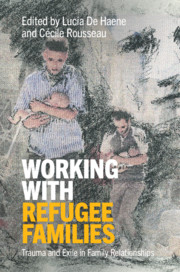Book contents
- Working with Refugee Families
- Working with Refugee Families
- Copyright page
- Dedication
- Contents
- Contributors
- Foreword
- Acknowledgments
- Introduction
- Part I Refugee Family Relationships
- Part II Trauma Care for Refugee Families
- Chapter 7 Mobilizing Resources in Multifamily Groups
- Chapter 8 Working through Trauma and Restoring Security in Refugee Parent-Child Relationships
- Chapter 9 Trauma Narration in Family Therapy with Refugees
- Chapter 10 Exile and Belonging
- Chapter 11 Working with Spirituality in Refugee Care
- Chapter 12 Collaborating with Refugee Families on Dynamics of Intra-family Violence
- Chapter 13 Supporting Refugee Family Reunification in Exile
- Chapter 14 Diagnosis as Advocacy
- Chapter 15 Reflexivity in the Everyday Lives and Work of Refugees and Therapists
- Part III Intersectoral Psychosocial Interventions in Working with Refugee Families
- Conclusion
- Index
- References
Chapter 9 - Trauma Narration in Family Therapy with Refugees
Working between Silence and Story in Supporting a Meaningful Engagement with Family Trauma History
from Part II - Trauma Care for Refugee Families
Published online by Cambridge University Press: 21 August 2020
- Working with Refugee Families
- Working with Refugee Families
- Copyright page
- Dedication
- Contents
- Contributors
- Foreword
- Acknowledgments
- Introduction
- Part I Refugee Family Relationships
- Part II Trauma Care for Refugee Families
- Chapter 7 Mobilizing Resources in Multifamily Groups
- Chapter 8 Working through Trauma and Restoring Security in Refugee Parent-Child Relationships
- Chapter 9 Trauma Narration in Family Therapy with Refugees
- Chapter 10 Exile and Belonging
- Chapter 11 Working with Spirituality in Refugee Care
- Chapter 12 Collaborating with Refugee Families on Dynamics of Intra-family Violence
- Chapter 13 Supporting Refugee Family Reunification in Exile
- Chapter 14 Diagnosis as Advocacy
- Chapter 15 Reflexivity in the Everyday Lives and Work of Refugees and Therapists
- Part III Intersectoral Psychosocial Interventions in Working with Refugee Families
- Conclusion
- Index
- References
Summary
With the sharp increase of refugees’ arrival and resettlement in western communities, adequate mental health care forms a pivotal dimension in host societies’ responses to those individuals and communities. Clinical literature shows a growing interest in the development of family therapy approaches with refugees, in which therapeutic practice engages with the pivotal role of refugee family dynamics in post-trauma reconstruction and adaptation in resettlement and aims at supporting post-trauma reconstruction through strengthening capacities to restore safety, meaning, and connectedness within family relationships. In this chapter, we focus on trauma narration or the narrative restoration of meaning as central mode of posttrauma reparation, and we explore its specific dynamics and relational complexities in therapeutic practice with refugee families. We build on theoretical and clinical scholarly work on trauma narration to develop a phased approach of interventive modes in working with trauma narration in refugee care. A clinical case analysis illustrates the cyclic engagement with the phased approach.
- Type
- Chapter
- Information
- Working with Refugee FamiliesTrauma and Exile in Family Relationships, pp. 148 - 171Publisher: Cambridge University PressPrint publication year: 2020
References
- 2
- Cited by



